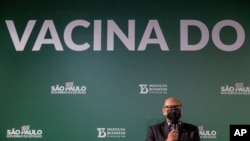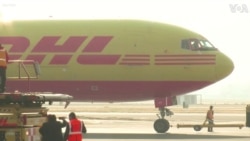Brazilian researchers said Wednesday the coronavirus vaccine developed by Chinese drug maker Sinovac Biotech was found to be more than 50% effective in a late-stage clinical trial.
But officials at the state-run research institute Butantan say they are withholding the results of the trial at Sinovac’s request, raising issues once again about the lack of transparency involving the vaccine’s development.
Tests of the Sinovac vaccine, dubbed CoronaVac, were halted last month after an “adverse, serious event” involving a volunteer participant in late October.
Sinovac is one of many drug makers around the world who have been racing to develop a safe and effective vaccine against COVID-19, which has killed more than 1.7 million people out of more than 78.7 million total confirmed infections, according to Johns Hopkins University’s Coronavirus Resource Center.
Latin America received its first doses of COVID-19 vaccine on Wednesday, with a shipment landing in Mexico City.
Mexico Foreign Secretary Marcelo Ebrard was on hand when the flight carrying the Pfizer-BioNTech vaccine landed from Belgium.
"Today is the beginning of the end of that pandemic," Ebrard said.
Mexico is scheduled to receive 1.4 million doses of the Pfizer-BioNTech vaccine. Officials on Wednesday did not say how large the shipment was, however, but said they planned to begin Thursday vaccinating health workers in Mexico City and Saltillo, in Mexico’s north.
Other Latin American countries are expecting vaccine shipments or, as Argentina did on Wednesday, approving vaccines for use in their countries.
The United States is about to complete its second week of vaccinations with about 1 million inoculations, mainly among health care workers and elderly residents of nursing homes. But the numbers are far short of the goal set by Operation Warp Speed, the federal government’s effort to mass produce millions of doses of vaccines, to inoculate
20 million Americans by the end of the year.
U.S. Operation Warp Speed chief adviser Dr. Moncef Slaoui has warned that it would take longer to administer the doses.
"The commitment that we can make is to make vaccine doses available," Slaoui said during a press call. "How fast the ramp-up of immunizations, the shots in arms, is happening is slower than we thought it would be."
The Trump administration has reached a deal worth $2 billion to secure an additional 100 million doses of the COVID-19 vaccine developed by Pfizer-BioNTech, which would boost the nation’s vaccine supply to 200 million doses by mid-July 2021.
China on Thursday became the latest country to suspend all travel with Britain after the discovery of a new and more contagious strain of the novel coronavirus. The new variant of the novel coronavirus has swept through southern Britain in recent weeks, prompting British Prime Minister Boris Johnson to impose more restrictive lockdown measures in some parts of the country ahead of Christmas Day.








